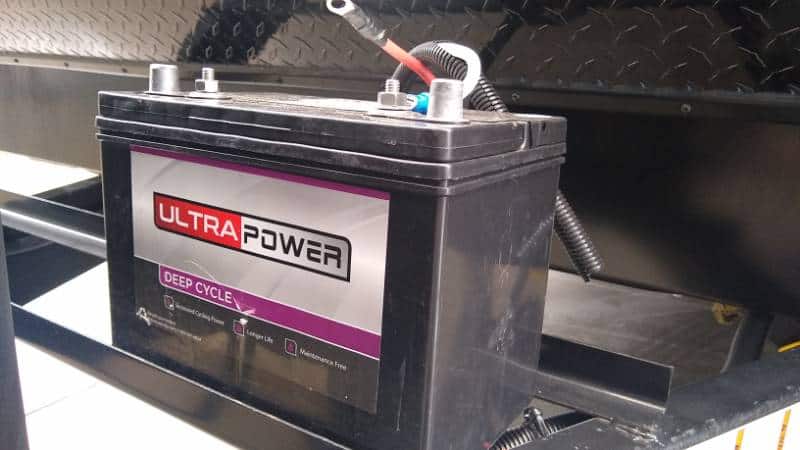How long will my RV battery last?
This is, truly, a question that can keep you up at night – especially if you lose power and the furnace turns off!
All RVs use a battery to provide 12-volt (12V) direct-current (DC) electricity to onboard appliances like lights, ceiling fans, water pumps, control boards, etc.
The battery also provides power while you’re traveling so all the basics of your RV still work. It even provides power so you can “dry camp” – that is, camp without being connected to shore power – for some time.
Without a battery, your RV cannot function.
If you’re considering boondocking or dry camping, you might be wondering, “How long can my battery last?”
It’s a simple question. An accurate answer is quite complicated to calculate. But with the Changing Gears EZ Battery Life Calculator, you can get a back-of-the-envelope calculation pretty quick!

Common RV Battery Life Myths
1. I Really Don’t Use That Much Power …
Almost everyone underestimates the amount of power they consume. At home, we almost never consider the amount of energy we’re sucking out of the outlets (not until we see the monthly utility bill, anyway).
You can measure the amount of energy you consume with two simple tools: a Kill-A-Watt meter and a clock. By measuring the amount of instantaneous power consumed by an appliance and multiplying that by time in use, you can calculate the total electric charge.
The truth is, most stock campers don’t have big enough batteries to survive off-grid more than 24-36 hours, even with moderately careful battery management.
2. I Just Really Need to Run My Air Conditioner for 30 Minutes
Sorry, there are just some things you can’t run off an RV battery.
For one thing, any AC-powered appliance cannot be powered directly by a DC battery. You’ll need an inverter, which inverts battery direct-current electricity to “shore power” alternating current electricity.
For another, most AC-powered appliances consume enormous amounts of energy. Without a huge battery bank, you just can’t run most AC appliances – like air conditioners, microwaves, and toasters – off a battery and inverter. This is for many reasons, including maximum discharge rate, converter capacity and efficiency, and inductive start-up loads, etc.
3. Doesn’t My Solar Panel/Tow Vehicle Charge My Battery?
As a rule, a solar panel or tow vehicle umbilical cord connection doesn’t charge your battery fast enough to replenish lost power.
Solar panels only generate significant amounts of power in direct sunlight at the proper angle. Dust and debris atop the panel will decrease their efficiency.
A tow vehicle umbilical cord connection is more a battery maintainer than a battery charger. Usually, voltage drop due to wire resistance prevents the battery from fully charging. A typical RV AGM house battery might only charge to 80-85% of capacity through the tow vehicle.
4. I Don’t Need a Battery. I’ll Just Run Everything Off Propane.
Sorry! Even your LP-powered appliances require some 12V power to run. Neither your fridge nor your furnace will operate without battery power. The control boards in both these appliances require 12V electricity to operate. When the battery’s open-circuit voltage drops to around 10.5V, these appliances will not function.
How to Calculate Your RV Battery Life
Calculating battery life seems simple: Just divide your energy capacity by the amount of energy you use.
Unfortunately, it’s somewhat of a mathematical obstacle course.
- Your energy capacity is NOT equal to the amp-hour rating of your battery bank system. Different battery chemistries have different useable energy capacities. A typical deep-cycle lead-acid battery, for instance, should not be discharged greater than 50%. So a 110-ah deep-cycle lead-acid battery only has 55 useable amp-hours. And we haven’t even talked about old or sulfated batteries, which don’t have 100% capacity remaining …
- A battery bank is usually rated at a C20 discharge rate. In other words, a 100-Ah battery could discharge 5 amps per hour for 20 hours for a total of 5×20=100 amp-hours! However, shorter discharge times – which is typical in the RV world – actually lessen the amount of useable energy! You might only get 80 or 90 amp-hours out of that same battery.
- An amp ISN’T just an amp. Amps vary by voltage. In other words, 1 amp at 12 volts doesn’t equal 1 amp at 120 volts! In fact, as a rule of thumb, 1 “shore power” amp is approximately equal to 10~11 “battery amps.” The unit that’s consistent across voltages is watts (see Ohm’s Law for more details).
- Some appliances don’t draw consistent power. An air conditioner, for instance, draws high amounts of power at startup due to something called “inductive loads.” And some appliances, such as a microwave, draw different amounts of power based on setting (e.g. high heat vs reheat). Without a detailed Owner’s Manual or Technical Data Sheet, you might not be able to find out how much power each mode or setting draws.
So it’s kind of hard to do all the math yourself. It’s an afternoon’s worth of work. You need to know the voltage rating, average wattage, and time used of every appliance or load (every light, pump, control board, appliance, etc.) And you need a realistic calculation of your actual battery bank capacity …
If you’re not scared off yet, then head over to Ask The RV Engineer to learn everything you can about RV batteries. Then you can work through all the calculations yourself.
If what we’ve described sounds like a special version of hell, proceed to the EZ RV Battery Life Calculator below! And remember:
The best thing is to do a practice run in your backyard.
*ALERT!*
As of January 8, 2024, this interactive RV calculator is temporarily suspended. We apologize for the inconvenience, and we hope to have the calculator back up and running soon. In the meantime, we recommend reading through the rest of the notes on this page, which may help clarify your understanding. Thank you for visiting Changing Gears.







